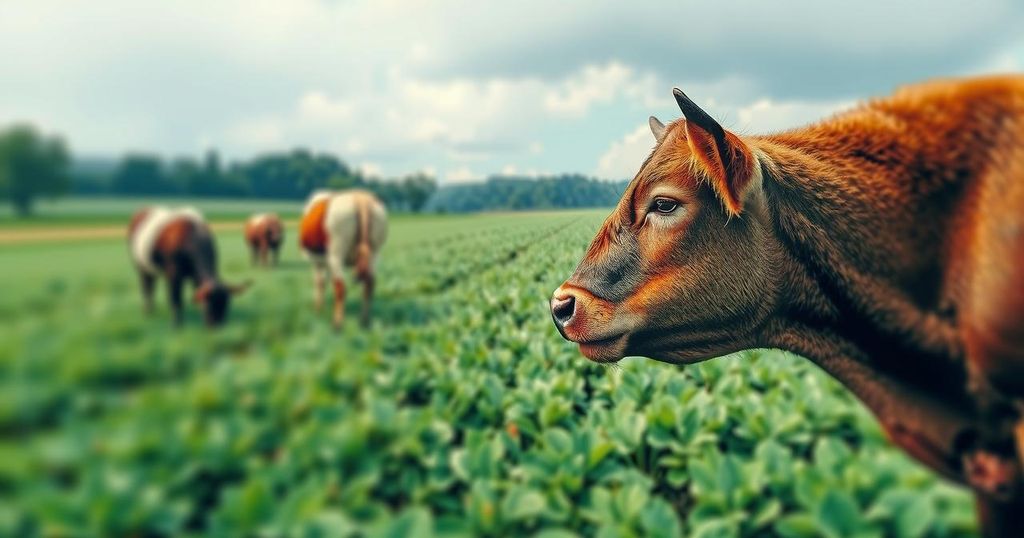This article discusses the critical role of livestock in climate action and rural livelihoods, particularly in Africa. While often viewed as environmentally detrimental, livestock can significantly contribute to biodiversity conservation, climate mitigation, and economic stability when managed sustainably. The article calls for international climate finance to support sustainable livestock practices, recognizing their vital contributions to food security and resilience in vulnerable communities.
Climate policies must not overlook the integral role of livestock in climate action and rural development, particularly within African contexts where the livestock sector significantly contributes to food security and local livelihoods. Africa is home to approximately 400 million cattle, with livestock accounting for 30 to 40 percent of the agricultural gross domestic product across the continent. Livestock provide critical nutritional sources through meat, milk, and eggs, alleviating malnutrition and offering reliable income streams in areas where alternative economic options are scarce. Despite their contributions, the environmental impact of livestock is often emphasized, leading to a perception that they are mere contributors to greenhouse gas emissions, land degradation, and habitat loss. This narrow perspective has resulted in insufficient investment in sustainable livestock practices, which are vital for environmental resilience. As international conferences focusing on biodiversity and climate action convene, it is essential to reshape the narrative surrounding livestock. Instead of viewing these animals solely as problematic, it is crucial to recognize them as potential allies in combating climate and environmental crises. Proper management of livestock can foster biodiversity, enhance soil health, and act as a mechanism for carbon sequestration. Livestock can effectively contribute to biodiversity conservation through well-managed grazing systems, which not only support ecosystem maintenance but also serve as economic resources for pastoralist communities such as the Maasai and Samburu in Kenya. Moreover, incorporating livestock into wildlife conservation strategies can enhance grassland health and prevent overgrazing, showcasing a symbiotic relationship between livestock production and ecological health. In the context of climate mitigation, livestock can be part of solutions beyond their methane emissions. Innovations in rangeland management and climate-smart feeding practices can reduce emissions while improving environmental outcomes. Additionally, livestock systems—including rangelands—serve as considerable carbon sinks when appropriately managed, with the potential to deliver substantial carbon mitigation benefits by 2050. Moreover, livestock are vital for communities facing climate unpredictability, particularly in arid and semi-arid regions. The adaptability of pastoralists and their livestock breeds, such as the East African Zebu, provides resilience against the challenges posed by changing climate conditions, thus underscoring the interconnectedness between livestock welfare and community survival. To address global land degradation, sustainable livestock management should be embraced as a tool for land restoration. By employing rotational grazing and controlled stocking densities, harmful overgrazing can be mitigated, permitting the rejuvenation of grasslands and improvement of overall ecosystem resilience. It is imperative to consider why the livestock sector remains underfunded in light of its critical contributions to environmental sustainability. International climate finance should prioritize the support of sustainable livestock systems, acknowledging their multifaceted role in addressing environmental challenges while simultaneously enhancing food security and economic growth. In summary, livestock should not be viewed as adversaries in the fight against climate change; rather, they are essential partners, particularly in regions heavily reliant on pastoralism and livestock practices for their economic and cultural sustenance.
The article emphasizes the importance of livestock in Africa’s agricultural system and rural livelihoods, highlighting their contribution to food security and economic stability. It addresses the misconceptions regarding the environmental impact of livestock, urging a reevaluation of their role in climate action. The narrative calls for acknowledging the benefits of sustainable livestock management practices and the need for increased investment in this sector to promote biodiversity conservation, mitigate land degradation, and enhance food systems, especially in vulnerable regions.
In conclusion, livestock are an essential component of both climate action and agricultural systems, particularly in Africa. They play a pivotal role in biodiversity conservation, climate resilience, and socio-economic stability. It is crucial for international policy and funding frameworks to recognize the positive contributions of livestock and support sustainable practices within the sector to harness their potential as allies in environmental and climate challenges. Addressing misconceptions and promoting a balanced perspective will facilitate the inclusion of livestock in climate adaptation and mitigation strategies, ultimately benefiting both rural communities and the environment.
Original Source: www.aljazeera.com






